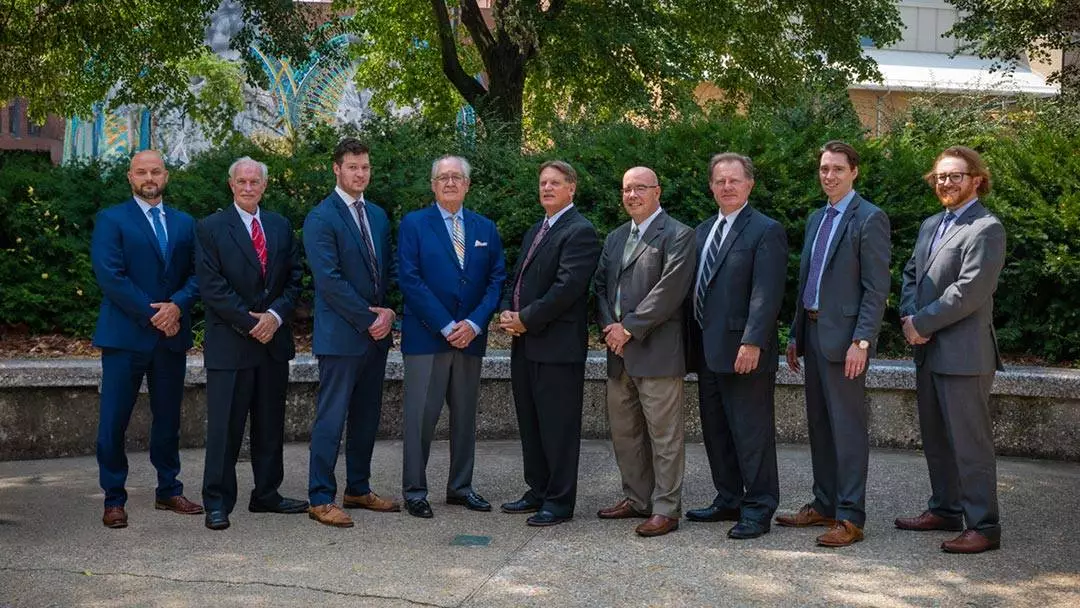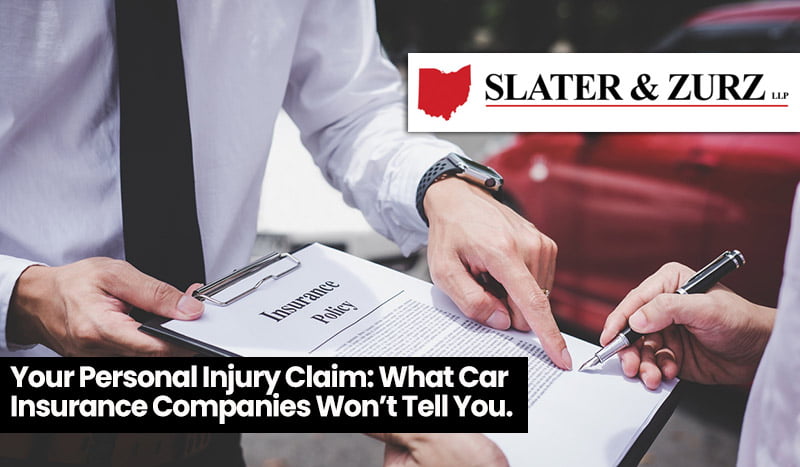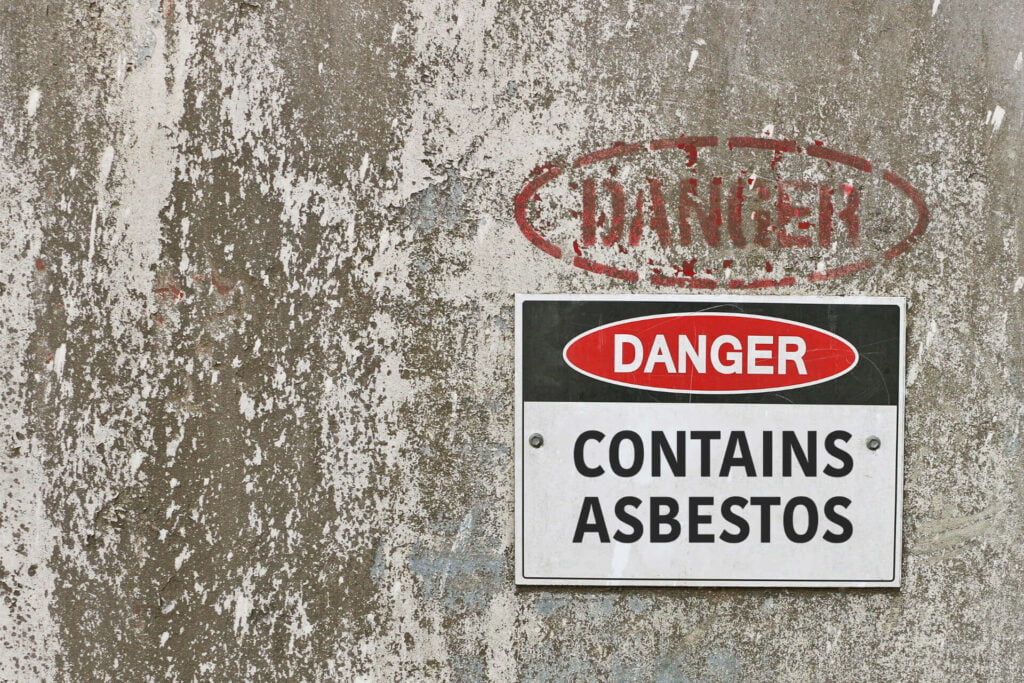Being injured under any circumstances is never pleasant—especially when it’s someone else’s fault. When you’re hurt, the pain and inconvenience are bad enough. When insurance companies try to limit or avoid their obligation to pay your medical bills and related losses, this truly “adds insult to injury.”
There are many scenarios in which an insurance company has a duty to compensate you for your injuries—and just as many schemes that insurance companies use to deny you the coverage you need and deserve, even when their obligation to pay is clear. At Slater & Zurz, we’ve dealt with almost every insurance company that issues policies or handles claims in Ohio. We’re familiar with their standard policies and will not be intimidated by stingy or aggressive adjusters. We’ve successfully handled injury-related insurance claims for over 30 years. If you’ve been injured in a motor vehicle accident, bitten by someone else’s dog, or hurt by a defect in a building or the surrounding area, to speak to our personal injury lawyer about your case for free. We’ll evaluate your claim, answer your questions, and recommend what we believe is the best path forward. If we take your case, you won’t owe us anything unless and until we win for you.
Different sources of injury are covered by different kinds of insurance.
There are two broad categories of insurance generally applicable to personal injuries: (1) liability coverage, available under homeowners’ policies, business and commercial policies, and motor vehicle policies; and (2) uninsured or underinsured motorist (UM) coverage, which is available under some motor vehicle policies, as well as some business and commercial policies.
Liability coverage compensates those injured by someone else’s negligence or carelessness—while driving, in maintaining their property, in failing to control a dog that bites someone without provocation, and in many other ways. UM coverage compensates you if
you are injured because of someone else’s negligent driving when insufficient liability coverage is available to cover your injuries.
You may be entitled to vehicle-related coverage if you are injured as a driver or passenger in a motor vehicle accident or if you are hit. At the same time, you are a bystander or pedestrian. You may be covered under homeowners’ insurance if you are injured on someone else’s property or injured on your own property by a homeowner’s carelessness.
Specialized insurance is available for particular injuries, such as workers’ compensation for on-the-job injuries and medical malpractice insurance for injuries caused by doctors’ medical errors.
Insurance companies are not on your side.
When you’re injured, your top priorities are obtaining the treatment necessary to restore your health, ensuring that your dependents receive the care that your injuries prevent you from providing, and figuring out whether and when you can return to work. Typically, the insurance company’s objective is to minimize its costs, regardless of the benefit—or lack of benefit—to your health and well-being.
Although an insurance company has an obligation to pay all legitimate claims under its policy, the company has the right to explore the nature of your claim, determine whether your claim is covered under its policy, and assess the value of your claim—how much the insurance company is likely to pay.
- The insurance company may deny coverage without giving you a reason.
- The insurance company may delay the payment by asserting that you were completely or primarily at fault, even though you weren’t.
- The insurance company may deny UM coverage by arguing that you aren’t covered under a family member’s, driver’s, or car owner’s policy when in fact, you are
- An at-fault driver’s insurance company may assert that the at-fault driver either wasn’t at fault or wasn’t covered under his or her policy when in fact, there is coverage.
Don’t take the word of any insurance agent—yours or anyone else’s—who insists that you’re not covered. At Slater & Zurz LLP, we’ve handled countless claims in which insurance companies initially denied coverage but later paid the claim. Call and speak with a talented personal injury lawyer for a free consultation. We will evaluate your claim based on the facts, the actual language in the insurance policy, and the law. We’ll answer your questions and let you know if you have a winnable case.
The “policy limit” is the maximum amount that an insurance company will pay for the type of coverage offered.
All insurance policies are subject to “policy limits”—stated amounts above which the insurance company will not pay, regardless of how severe a victim’s injuries may be. When someone has sustained serious, life-altering injuries, establishing coverage under every available policy can make the difference between mere survival and be able to relish, once again, the good times that define a meaningful life that is truly worth living despite the setbacks that accompany serious injuries.
Motor vehicle policies cover injuries and losses related to the ownership or use of a motor vehicle.
- Liability Coverage
Like most states, Ohio requires that everyone operating a car, truck, or motorcycle be insured to cover injuries and other losses caused by the vehicle’s ownership, use, or operation. Coverage can arise from using the insured vehicle or the policyholder’s permitted use of another vehicle, such as a rental or a borrowed vehicle that’s not available for the policyholder’s regular use.
- Uninsured and Underinsured Motorist (UM) Coverage
Many, but not all, motor vehicle policies contain UM coverage. UM, coverage applies if you are not at fault or if your share of fault is 50% or less. If you have UM coverage, either through your own or a family member’s policy or through a policy issued to the owner of the vehicle you’re in, the UM coverage will compensate you for your injuries to the extent that your financial loss exceeds the at-fault driver’s policy limit, up to the liability limit of the UM
coverage.
For example, if (1) the cost of your medical treatment and other losses is $50,000; (2) the at-fault driver’s liability policy limit is $25,000; and (3) the limit under your UM coverage is $100,000, you would be entitled to full compensation: $25,000 from the at-fault driver’s insurance company plus $25,000 under your UM coverage. However, if the at-fault driver’s liability limit is $25,000 and your UM limit is $25,000, you can collect only the $25,000 from the at-fault driver’s insurance policy. This is because UM coverage is limited to the UM policy, limitless what you can recover under the at-fault driver’s policy.
Homeowners’ policies are liability policies that cover injuries caused by the negligence or carelessness of the homeowner, his or her family members, and sometimes, the homeowner’s employees.
Homeowners’ policies typically cover injuries caused by a homeowner’s negligence, members of their family, and some employees working in or on the property.
Homeowners’ insurance covers injuries caused by defects in the insured property—a loose railing that leads to a fall from stairs or an upper floor, or a tree limb that falls from the homeowner’s property and hits you, for example.
Homeowners’ policies also cover the homeowner of the insured property. If you’re bitten by an insured homeowner’s dog, the homeowner’s insurance may cover the costs arising from the bite. If your neighbor’s child throws a ball from the street that hits your child, your child’s injuries may be covered by the neighbor’s homeowner’s policy.
Consult an attorney before attempting to negotiate with an insurance company.
If you are injured—from an auto accident, from a fall on someone else’s property, from a dog bite, or from some other occurrence that isn’t your fault—don’t try to negotiate with any insurance company without first consulting an attorney. The insurer will likely either deny your claim or offer a quick settlement for far less than your claim is worth.
Broken bones may be easily detected, and the cost of treatment estimated, but you may not discover soft tissue injuries affecting muscles, ligaments, tendons, and nerves right away. Dog bites are visible and can be treated and stitched up at the time of the bite—again at a seemingly determinable cost. However, in rare cases, dog saliva can later result in a severe infection that may require hospitalization or even the amputation of one or more limbs, costing tens or even hundreds of thousands of dollars. A quick settlement for a minimal amount, covering only superficial wounds or symptoms, may not begin to cover all the treatment costs.
At Slater & Zurz LLP, we’ve represented thousands of personal injury victims on claims for which insurance benefits were the primary—if not the only—source of compensation for victims. We’re familiar with the terms of most insurance policies, as well as the procedures and tactics insurance companies use to defeat or minimize injured victims’ claims. Call or email our team of professionals to schedule a free consultation, and we’ll let you know what your rights are and what the insurance company should be offering you to resolve your claim. If we take your case, we will not charge you anything unless we win in court or negotiate a favorable settlement for you.
Beware of an insurance company’s lawsuit seeking a “declaratory judgment” to avoid paying you anything.
Insurance companies are familiar with the defenses that they have successfully employed to deny coverage in the past. Insurance companies routinely use tactics that all too often succeed in eliminating coverage that should have resulted in compensation for the victims.
One tactic that insurance companies use is to sue the victim and the policyholder for a “declaratory judgment,” asking a court to declare that the insurance policy affords no coverage for the victim. These lawsuits are often written in “legalese” and are difficult for the average layperson to understand. The insurers do not demand money damages—all they seek is a written judgment declaring that the insurance company has no duty under the policy to “indemnify the insured”—i.e., to compensate the victim.
The victim may not even know that the insurance company that filed the lawsuit is ultimately responsible for covering the victim’s injuries. Without legal advice, neither the victim nor the policyholder may know that insurance coverage can be lost if no one responds to the lawsuit. If neither the victim nor the policyholder responds, the insurance company may be granted the declaration that it seeks: the court can issue a judgment for the insurance company without notice to either the policyholder or the victim and a hearing.
Months, sometimes over a year later, the victim may sue the policyholder seeking compensation for their injuries, and either or both may seek coverage under the insurance policy. The insurance company will then present its judgment declaring that it has “no duty to indemnify the insured”—i.e., there is no coverage under the policy, despite the policy’s language indicating otherwise. The policyholder loses the coverage they paid for, and the victim may lose the only available source of compensation for their injuries. Don’t be tricked by an insurance company’s lawsuit—if you’re sued by an insurance company, seek legal help immediately!
Place your trust in an established law firm with a record of success in handling personal injury cases and holding insurance companies responsible for payment.
If you’ve been injured in an accident that is not your fault, you owe it to yourself to reach out to an established law firm with a proven record of success in handling personal injury cases. An insurance company faced with the prospect of having to compensate you for your injuries is not likely to tell you if you have a strong case or advise you to consult with a lawyer before attempting to negotiate on your own.
At Slater & Zurz LLP, we build relationships with our clients through honesty, commitment, perseverance, and trust. Like so many others who have placed their trust in us, you can count on us to fully assess your personal injury claim, review any pertinent insurance policies, answer your questions, and advise you concerning the best way forward. If you’ve been sued by an insurance company after being injured by someone else’s negligence, our personal injury lawyers can handle it! Call or email the dedicated professionals on our team for a free consultation. We’re here to serve your legal needs with unwavering dedication and the determination to win for you.






